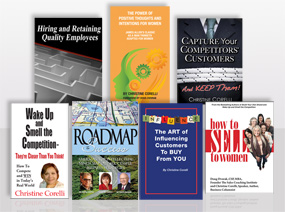
Harley-Davidson made news (and a fortune) by asking a great question. Here’s the short version of this amazing success story.
For many years, Honda had been far outdistancing Harley-Davidson in the motorcycle marketplace. The leaders at Harley-Davidson struggled to find the answer to this dilemma and make their mark in the motorcycle manufacturing business. Finally, the Harley-Davidson execs assembled their entire work force, including their assembly line workers, and asked them directly, “What ideas do you have to help us increase our market share?”
The response was amazing. The ideas that came from their own employees led Harley-Davidson in the right direction. Some of the suggestions that day and thereafter were to take the opposite approach to marketing and advertising from Honda, develop a clothing and accessory line, and make it a status symbol to own a Harley. They also recommended that Harley-Davidson’s marketing and advertising department initiate campaigns targeting executives and women, something they had not done in the past. Since their culture at the manufacturing plant was such that all employees were considered “family,” they also suggested that they make their dealers and customers feel like family too.
You know the rest of the story. Harley put their employees’ ideas to work and became a competitor to Honda, with a highly impressive increase in market share. Not willing to cease their practice of employee involvement in their decision making, Harley leaders continue to ask employees at all levels for their input and ideas. Today, Harley-Davidson is not only highly successful, but it’s considered a status symbol to own one of their motorcycles, wear their clothing, and own any of their merchandise. And, they have an ever growing number of loyal executive and female riders who are part of the Harley “family.”
In addition, they know how to make their customers feel like family. They achieved this success by asking a basic question—”What ideas do you have?” And they credit their success to their greatest asset—the combined brainpower of their people.
Talking is not enough
How about you and your business? Think about it. Business experts report that eighty five percent of your career success is in direct proportion to your ability to communicate. I disagree. I believe that the ability to communicate in any given situation determines your success—not just in business—but also in life.
One of the most effective communication techniques is not what you would think. Most people would say that a significant amount of talking is the basis of the best techniques in communication. Taking a lesson from Harley, the more effective approach is asking questions.
Talking is one-sided. You just hear yourself speak—and you already know what is on your mind. What you don’t know, and need to find out, is what is on the other person’s mind. That allows you to expand your world. You hear ideas, uncover problems, and discover the opinions, and concerns of your customers, potential customers, and employees. You gain greater insights into what is happening in your business or service delivery. You learn ways to resolve conflicts. Most important of all, asking questions leads to good listening skills, which will help you build quality relationships.
When you ask questions, customers or prospects know immediately that they are important and that you care about their wants, needs, problems, and desires. When you ask an employee a question, you demonstrate that you respect his or her opinion and provide a voice in your decision-making process.
Active listening for sales success
Nowhere is the “art of great questioning” more crucial than in sales. Recall a lesson from Sales 101—”Mediocre sales people talk when they should be listening and listening is a function of asking. Superior sales pros ask questions to get the customer to talk. You’ll never listen yourself out of a sale but you have to ask questions first.”
Top sales pros create and memorize a matrix of great questions to ask customers and prospects:
• “What do you want to accomplish?”
• “What can I show you today?”
• “What are you using now?”
• “What are some problems you’ve had with your equipment in the past?”
• “What questions or concerns do you have?”
• “Have I answered all of your questions?”
• “Would you like a demo?”
• “How’s that big project going for you?”
• “Would you like us to come out to your job site?”
• “What would be most convenient for you?”
These are just a few examples of questions that apply to almost any sales situation. They may seem obvious, but they work. Develop your own great questions, apply them, analyze what works, and memorize them to use in various scenarios.
Another basic principle from Sales 101 is “to ask for the sale.” This means that you fire the final, most important question at the appropriate moment. “Are you ready to move forward?” “Would you like me to write it up?” Asking for the sale should be second nature to you. Memorizing the right questions will increase your ability to close.
Asking questions helps you to learn about your level of service, build strong customer relationships, and establish higher levels of customer loyalty. Some of the more effective questions are as follows:
• “Were you pleased with our service?”
• “Is there anything more I can do for you today?”
If you have a customer over a period of time, it’s always smart to dig a little deeper.
• “What do you like about doing business with us?”
• “What should we start doing?”
• “What should we stop doing?”
• “What should we do better?”
Every employee in your business with customer contact should ask questions with every interaction—questions that demonstrate friendliness, customer care and professionalism. These enhance customer relationships and build trust:
• “How are you today?”
• “How can I be of service?”
• “May I tell him the nature of your call?”
• “Have I answered all your questions?”
• “How do you like the new tractor?”
• “How’s your business doing?”
• “Is there anything more I can do for you today?”
Building strength from the inside out
Asking for input from your employees will improve morale. It is vital to your company’s success. Unfortunately, many employees have learned not to speak up and share their thoughts, ideas, and concerns with superiors because they fear repercussions. Therefore, you must ask them direct questions. Smart business leaders regularly ask employees for suggestions and comments:
• “What are complaints do you hear most often? ”
• “What more can we do to improve service and demonstrate we are truly a customer-focused company?”
• “What complaints do we hear the most?”
• “Do you know any qualified service technicians who might want to come over to us?”
One of the most direct questions you should ask on a regular basis to uncover problems within your company, or with customers is “Is there anything I should I know about?” The answers could surprise you and avert a potentially damaging situation. Asking is the first step in being prepared.
Below are additional tips to apply when you are asking questions:
Tips on asking questions the right way
Always ask a direct question.
Most of the time it is better be direct to receive the appropriate answer to your questions. This is especially true when you are interacting with a passive person or making an effort to resolve conflict. Questions such as, “John, what are your thoughts and opinions?”, “Joe, I’m sensing you are not happy. What’s bothering you?” or “Joe, I know we don’t always see eye to eye, and we’ve even butted heads a few times. What can I do to straighten things out with you?” will go a long way to getting a response you can act upon. And if ask in a soft voice and sincere manner, it will show the person you care.
Stay “you” conscious.
When interacting with others, refrain from saying “I” as much as possible and stay “you” conscious. You do this by removing the personal pronoun and always turning your phrases toward the recipient. For example: “How do you feel about the idea?” “What are your thoughts?” “What’s the most important thing to you about what was just discussed?”
Use the person’s name in your question.
If you are speaking one on one, always use the person’s name. This may seem obvious to you, but many people forget to do this simple rule. Don’t ignore it—you will make the receiver feel important and more receptive to what you have to say. For example, “Joe, I’d like to speak with you again next week, would that be agreeable to you?” When speaking to a group, say something similar to the following— “John, Susan, Harry, that wraps it up. What comments or questions do you have?”
Observe non-verbal communication.
Asking questions is an excellent communication skill because it provides you with an opportunity to discover your listeners’ personality and observe his or her body language so you can determine whether it’s best to continue speaking, ask more questions and listen, or shift gears. Watch for scowls, frowns, signs of boredom, looks of disbelief, or smirks. If you identify your prospect as becoming disenchanted, immediately ask, “What are your concerns?” or “Do you have reservations?” or “What are your thoughts?” Often, these questions will correct the communication problem and involve the recipient in the exchange
Winning employees over means great rewards for all
I experienced a real world situation where asking questions helped a new leader win the hearts of a nervous group of employees. Recently, I was a guest speaker at a company meeting where the owner was retiring and the son was becoming the new president. The purpose of the meeting was to ease fears about the transition. Most of the employees had worked for the father for many years and they were worried about what to expect from this sharp young MBA. Some were worried that they would lose their job.
In the first few minutes, he broke the ice and changed the atmosphere in the room with these words: “In the next several weeks, I will be speaking one on one with each of you. Here are the questions I will be asking you today and in the weeks ahead.
• “What can I help you do help you enjoy your job more?”
• “What skills do you need?”
• “What might be preventing you from performing your job more effectively?”
• “What do you like about our company?”
• “What can we do better?”
• “How can we streamline what we do, eliminate red-tape, and keep you and our customers happy?”
• “What can I do to make sure you and our customers feel like family?
He concluded by saying that he wanted to know from each and every one of them the answer to one final question—“What would you do if you were the new president of this company?” His entire staff broke into applause. Smart man! He scored and a positive transition was underway.
It can be habit-forming
Make it a habit to ask questions until it becomes second nature. It will improve your interpersonal skills in both business and social settings. Remember, questions lead to answers. Answers lead to rapport. Rapport leads to uncovering what others are thinking so you can respond or take action accordingly. When you craft your questions perfectly, you will dramatically improve your communication and social skills.
Don’t forget to ask questions to demonstrate you are connected to customers and employees as human beings, too—”How’s your family?”, “How’s your golf game these days?” or “Did you enjoy your vacation?”
You will benefit ten-fold from perfecting the art of asking questions: It will help you in business and in your personal life as well. Think about how might significantly increase the odds in your favor if you ask questions such as, “How was your day today?”, “How did you do in school today, son?”, “How would you like to watch the game with me tonight?”, “Is there anything I can do for you?”, or even “How are you feeling today Mom?” Makes sense, doesn’t it?
Remember, eighty-five percent of your overall success in LIFE is in direct proportion to your ability to communicate. Life is for the asking so ask away.

